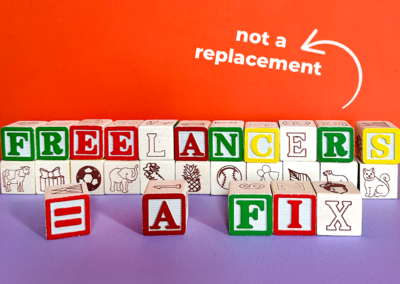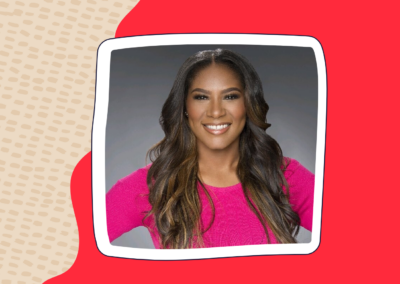To this day my family laughs about this story: “Remember that time Analisa lost it because she got a yellow bear?!”
I laugh too. But, I also always feel the urge to reach back and hug 6 year old me.
In first grade, I transferred to a new school; my mom had switched teaching jobs. She saw some value in driving my brother and me to school everyday with her and not worry about making it cross-town to pick us up.
One day, my teacher, Mrs. Garza, had split us up into reading groups. When it was my group’s turn, she scolded us because we weren’t “reading loud enough.” The second time we didn’t read loud enough, Mrs. Garza decided we each deserved “yellow bears” as punishment.
For context: In elementary, we were sent home with a different colored bear every day that was meant to illustrate our behavior and any next steps a child/parent would need to take depending on the severity. Blue bear, you’re golden. Yellow, you’re teetering. Green, probably a conference.
And red? Uh-oh.
That day I got my first yellow bear. I was pissed. My fellow quiet readers and I were unjustly served, but I didn’t have the voice to communicate that quite yet. Instead, I broke out into uncontrollable sobs. It worried Mrs. Garza so much that she called my mother out from her classroom to come and speak to me when offering snacks wouldn’t work as consolation.
This may be the right time to tell you: I have a Mexican mom.
She came over, told me to accept my punishment, and told Mrs. Garza she should feel empowered to discipline me for my actions however she saw fit. And please, please stop bribing me with snacks.
Now, I know that my reaction wasn’t out of fear of authority. Or sadness. I didn’t need snacks, or my mom to come and give me a hug. I just needed to figure out where my words were. I had the 24/7 monologues in my head, and I didn’t know how to get them out. My outburst that day was simply a manifestation of anxiety, and anger. Ironically, people I work with now tend to comment that I’m a “straight shooter.” The truth is that I’ve learned the more plain and honest I am, the easier it is to speak up and get out of my own way. You could call it a defense mechanism, with its roots in that damn yellow bear.
While I grew up to be student class president all throughout high school, a co-founder in my early 20s, and a small business owner today— at my core, I’m a Grade A introvert.
That day as a first grader was the first day of the rest of my life being told that introversion was a bad, no-good thing. “Soft spoken people aren’t leaders.” I’d spend the next 20-odd years compensating.
I learned how to turn it “on”, so to speak. Combined with the code-switching— as a Mexican-American woman from the tip of Texas working for majority-white founders and brands coast to coast —I had become quite the chameleon. While this could work to my advantage, I also found it exhausting.
And then in 2018 I lost the job I had in New York. Rather, the role and entire department was essentially dissolved within weeks. It was traumatic, but it helped me realize I had been trying for far too long to fit my personality and skills into a box that just. wasn’t. working.
At that point in my career my confidence was shot. I had spent years letting the wrong people tell me who I was or wasn’t, and not enough time sitting with myself— mostly because I was moving too fast to reach arbitrary goals. I hadn’t stopped to ask what I actually wanted to be doing, and instead kept morphing myself to match the next job description or ask from a manager.
Trying to be everything for everyone had left me with nothing to speak for.
So, I went back to square one. I started freelancing to make ends meet, and in the process of betting on myself, I found what excited me again. Before long, I had given up the job hunt, created a template for contracts, and upgraded my Squarespace account. All the parts of me that I had been told didn’t add up, suddenly did. Big time.
As it turned out, I didn’t have to be the loudest voice in the room to be heard. I had to get in the room, sure, but that had nothing to do with being loud. It was about being strategic. Paying attention to what was being said, what wasn’t. Understanding motivations. I was good at it. I had been observing people all my life, picking up cues so that I could figure out which part of me I needed to emphasize or downplay that day.
Susan Cain’s book (which inspired this piece) Quiet: The Power of Introverts in a World That Can’t Stop Talking speaks to this gentler form of leadership: “Aggressive power beats you up, soft power wins you over. Soft power is quiet persistence. The people I’m thinking of are very persistent in their day-to-day, person-to-person interactions. Eventually they build up a team.”
Introverts get a bad rap, it’s certainly why I denied the label for so long. When you think of the introvert stereotype, you might imagine a socially handicapped adult who can barely say their order out loud to the barista and is living a greyscale life. Certainly not movers and shakers.
But without people whose natural inclination is introversion, we wouldn’t have leaders like Warren Buffet, Barack Obama, Hillary Clinton — a few of many self-described introverts who made their mark on the world through calculated risk, thoughtful communication, and discernment.
We also wouldn’t have some of the best independent consultants. Who is more equipped to be plugged into an organization (in as quick as 72 hours if we’re talking the #WeAreRosie model) and figure out a game plan than someone who is inclined to listen to others, lacks interest in dominating social situations (read: no ego), has mighty powers of concentration, and notices subtleties that others miss?
There’s something else that Cain notes in her book that stuck with me: Introverts have a difficult time projecting artificial enthusiasm. It may be another reason I had trouble sucking up my yellow bear that day, but also why someone like me was able to quickly shift gears when life threw a curveball. Losing my job gave me the space to hear myself again, even if only for a few weeks (because you know, bills). I decided I didn’t like the path I was on, so I made a few calculations and knew I could change course while mitigating risk. What others saw as a rash decision was actually just a few hours of intense focus. As Cain says: “[…] there’s a hidden advantage to this inflexibility: it can motivate us to make tough but worthwhile career changes if we find ourselves compelled to speak too often about topics that leave us cold. There is no one more courageous than the person who speaks with the courage of his convictions.”
Here’s to introverts: to our courage, conviction, and soft persistence.
Analisa’s Socials: LinkedIn, Twitter, Instagram
Editor’s Socials – Bennett D. Bennett: LinkedIn , Twitter



